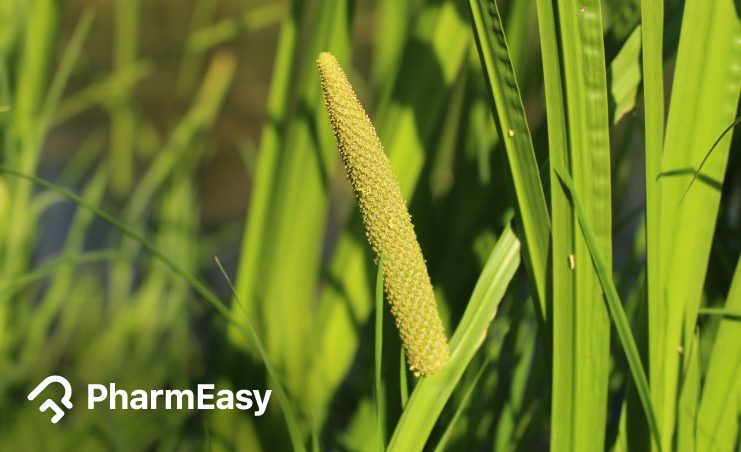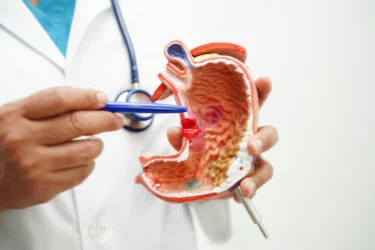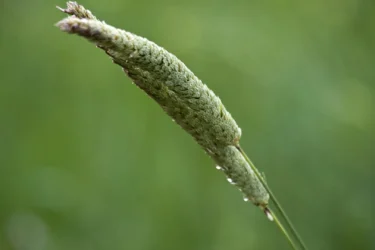Vacha (Acorus calamus): Uses, Benefits and Side Effects By Dr. Rajeev Singh
By Dr Smita Barode +2 more

Get,

to manage your symptom
Get your,


4 Cr+ families
benefitted

OTP sent to 9988776655



You’ve successfully subscribed to receive
doctor-approved tips on
Whatsapp

Get ready to feel your best.

Hi There,
Download the PharmEasy App now!!


Register to Avail the Offer
Send OTPBy continuing, you agree with our Privacy Policy and Terms and Conditions

Hi There,
Sign up on PharmEasy now!!
Trusted by 4 crore+ families

OTP sent to 9988776655



You have unlocked 25% off on medicines




Code: NU25
By Dr Smita Barode +2 more
Table of Contents
In the Ayurvedic medicine system, Vacha may be considered a well known medicinal herb used for over 100 years. Vacha, scientifically known as the Acorus calamus, belongs to the family Acoraceae. The Vacha plant is a grass like semi-aquatic herb that grows in moist, marshy lands like ponds, rivers and swamps. Vacha plant is an aromatic herb with creeping rhizomes which has a pleasant and sweet odour due to its essential oils. According to the Red Data Book, the Vacha plant has been considered one of the threatened species. It is native to India and grows in the marshy lands of Kashmir, Manipur and Nagaland. However, it is also found in other countries such as Europe, Russia, Asia, China, Sri Lanka, Japan, Burma, Indonesia, the USA and Canada. Other names of the Vacha plant are calamus, sweet calomel, sweet flag, sweet sedge, myrtle flag, Haimavati, Sadgrantha, Bach, Vekhand, etc1,3. Let us read more about the Vacha plant benefits, nutritional facts, potential uses and more.

One hundred grams of Vacha may have 121.65 Kcal of energy4. The nutritional value of the Vacha plant is as under:
β-asarone is the major phytochemical constituent present in Vacha. Furthermore, other phytonutrients like tannins, β carotene, phytic acids, choline, flavones, ethanol methanol, camphor, eugenol and phenols may also be present in Vacha1,2,4.
Vacha medicinal plant may include the following properties1,5:
The following may be the potential uses of Vacha:

Vacha may have anti-diarrhoeal activity. An animal study1,2 by Kapadia et. al in 2012 reported that Vacha plant extract might contain phytochemicals like glycosides and saponins. These phytochemicals in the extract may help relieve symptoms of diarrhoea and dysentery. The experimental analysis showed that a single dose of Vacha extract significantly decreased the severity of diarrhoea and reduced the rate of excretion in animal models. However, this information is insufficient as this study is conducted on animals. More human research is needed to suggest the uses of the Vacha plant for diarrhoea. If you have diarrhoea, consult with doctors and do not self-medicate.

A diet low in fibre might cause complications like constipation. A study4 by Oyenuga and Fetuga in 1975 suggests that the crude fibre content of the Vacha plant rhizome is as high as about 6.5%. Adding fibre to a diet might help absorb essential minerals in the stomach, increase the digestion process and decrease cholesterol absorption. However, excess consumption should be avoided. Hence Vacha may possess beneficial effects on constipation. Furthermore, clinical studies are needed to continue using Vacha for constipation. To solve your constipation problems, consult a specialist. Avoid self-medication.

The Vacha rhizome extract may have anti-ulcer activity. An animal testing experiment by Rafatullah et al. 1994 suggests that it may contain certain compounds that might stop the stomach’s acidic secretion and help defend the mucosal lining from ulcer causing agents2 . However, further research in humans is needed to use the Vacha plant for managing ulcers. If you have ulcers, kindly consult a qualified doctor and get proper treatment.

The Vacha plant in Ayurveda may have been listed as a traditional plant used as a brainpower-enhancing agent that can act against mental disorders including depression. A study1,2 by Manikandan et al., 2005 suggested that Vacha extract may decrease the brain lipid peroxide (free radicles damage the brain cells). This might have a beneficial effect on memory disorder and learning performance. When combined with Polygala root, Vacha might help maintain the mental well-being and intellectual power of the elderly. It may also help with memory loss, confusion, consciousness loss and forgetfulness. Vacha plant may act as a rejuvenator, enhancing brain functions and building memory power. More human research is required to study the true scope of Vacha on mental health. Consult a qualified doctor for any mental health difficulties.

Though studies show the potential uses of Vacha in various conditions, these are insufficient and there is a necessity for further studies to develop the scope of the benefits of Vacha on human health.
Based on what I have noticed, Vacha has been proven beneficial for various conditions in traditional medicine. It is known to possibly help reduce swelling and address skin conditions effectively.
Dr. Siddharth Gupta, B.A.M.S, M.D (Ayu)
You may use the Vacha plant as follows:
You should consult a qualified doctor before having Vacha in large quantities. Do not discontinue or replace an ongoing modern medical treatment with an ayurvedic/herbal preparation of Vacha without consulting an ayurvedic physician. They will guide you with its form and dosage per your health condition.
Judging from what I have seen, Vacha has a unique ability to control elevated body temperature caused by Glycopyrrolate (a medication). This might be helpful for patients who already have high body temperature, as it promotes sweating and helps regulate body heat6.
Dr. Rajeev Singh, BAMS
Safety analyses of Vacha on animals have shown that Vacha extract may have toxic effects. Below may be some Vacha plant side effects:
If you experience such side effects, immediately consult a doctor and get the proper treatment.
Based on my experience, I can say that Vacha works wonders when it comes to easing uncomfortable cold in children. It’s like a wonder medicine for cough and sore throat! By simply sucking on a small piece of Vacha, children with difficult cold and cough might find relief from these uncomfortable conditions7.
Dr. Smita Barode, B.A.M.S, M.S.
Having Vacha in small quantities might be safe. However, eating in more significant amounts may be harmful. Therefore, precautions are necessary:
Also Read: Barley: Uses, Benefits & Side Effects
Vacha plants may interfere with certain drugs/medicines, leading to herb drug interaction.
Therefore, you should avoid having Vacha preparations with any medicine and if any complications arise, take doctor’s consultations.
Also Read: Nishigandha (Tuberose): Uses, Benefits and Side effects by Dr. Smita Barode
The Vacha plant side effects may include stomach irritation, disturbed digestion, persistent constipation, gastroenteritis, diarrhoea and passage of blood into the faeces2,4. If you experience such side effects after having Vacha preparations, immediately consult a doctor and get appropriate medication.
Vacha plant in Hindi is called Bach in English is called Calamus, Sweet Calomel, Sweet Flag, Sweet Sedge, Myrtle Flag in Marathi is called Vekhand and in Sanskrit is called Haimavati and Sadgrantha1,3.
Vacha plant may have activities such as antifungal, antioxidant, antibacterial, anti-ulcer antispasmodic, analgesic, anti-inflammatory, anticonvulsant, blood sugar-lowering and lipid-lowering properties. It may also act as a rejuvenator, expectorant, calming and sleep-inducing agent. It may help relieve flatulence and help stop the abnormal growth of cancer cells1,5.
Animal studies by Taylor et al., 1967 and Goggelmann et al., 1983 suggest that Vacha plant may contain a photochemical called β-asarone, which might be carcinogenic. It might have the potential to cause tumours in animals3. However, more information is needed to suggest the carcinogenic effects of Vacha on humans. Therefore, before having it consult a doctor and do not self-medicate.
Vacha plant extract may interact with particular anti-depressant medicines (MAO inhibitors)3. Therefore, you should avoid having Vacha extract and anti-depressant drugs simultaneously to avoid herb-drug interaction.
Disclaimer: The information provided here is for educational/awareness purposes only and is not intended to be a substitute for medical treatment by a healthcare professional and should not be relied upon to diagnose or treat any medical condition. The reader should consult a registered medical practitioner to determine the appropriateness of the information and before consuming any medication. PharmEasy does not provide any guarantee or warranty (express or implied) regarding the accuracy, adequacy, completeness, legality, reliability or usefulness of the information; and disclaims any liability arising thereof.
Links and product recommendations in the information provided here are advertisements of third-party products available on the website. PharmEasy does not make any representation on the accuracy or suitability of such products/services. Advertisements do not influence the editorial decisions or content. The information in this blog is subject to change without notice. The authors and administrators reserve the right to modify, add, or remove content without notification. It is your responsibility to review this disclaimer regularly for any change
Comments

Leave your comment...
You may also like
Comments